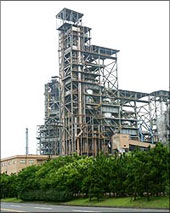 The Orissa government on Tuesday rejected the demand to scrap Posco's steel project, saying the Rs 51,000-crore (Rs 510 billion) project could contribute 11.5 per cent to the state's gross domestic products in terms of value addition.
The Orissa government on Tuesday rejected the demand to scrap Posco's steel project, saying the Rs 51,000-crore (Rs 510 billion) project could contribute 11.5 per cent to the state's gross domestic products in terms of value addition.
Dismissing the demand by the Bharatiya Janata Party and the Communist Party of India to scrap the project and not to renew the MoU with the South Korean steel major which lapsed yesterday, Orissa's steel and mines minister Raghunath Mohanty said, "Posco-India project will immensely benefit the state's economy."
Quoting a study conducted by National Council of Applied Economic Research, the minister said that the Posco-India project would alone contribute about 11.5 per cent to the state's GDP in terms of value addition. "It will create about 870,000 of direct and indirect employment, of which 18,000 will be direct employment."
He also rejected the demand by anti-Posco agitators for shifting the proposed steel plant site near Paradip.
"There is no plan to shift location of the project," Mohanty told PTI in an interview, adding the proposed site was most suitable to set up a greenfield port-based 12 million tonnes per annum steel mill.
As the MoU for the proposed mega project signed with South Korean steel major on this day in 2005 expired, the government said steps had been initiated for its renewal.
While anti-Posco agitators had been demanding shifting of the proposed mega steel plant from the area in view the sustainable agrarian economy at the proposed plant site villages, the state government maintained that the South Korean steel major had examined several alternative sites before zeroing on Dhinkia area near Paradip.
Asked if SEZ status to the project could eat into the state's expected revenue generation, he said that Posco would contribute Rs 77,870 crore (Rs 778.70 billion) to the state in 35 years from the date of commissioning.
On the clause in the MoU which allowed the South Korean steel major to swap iron ore, the state government maintained that lack of understanding of the reasons behind such a clause had led to criticism.
"Based on a study on the type of the iron ore available in Orissa, Posco felt that although there was iron ore of high Fe content in the state, percentage of impurities like sulphur and particularly alumina was beyond one per cent," a senior official in steel and mines department said.
Alumina content beyond one per cent adversely affects productivity and longevity of the furnace and leads to increase in fuel consumption, the official added.
In return, the company had to bring back equal amount of raw materials from other countries," the MoU conditions said.